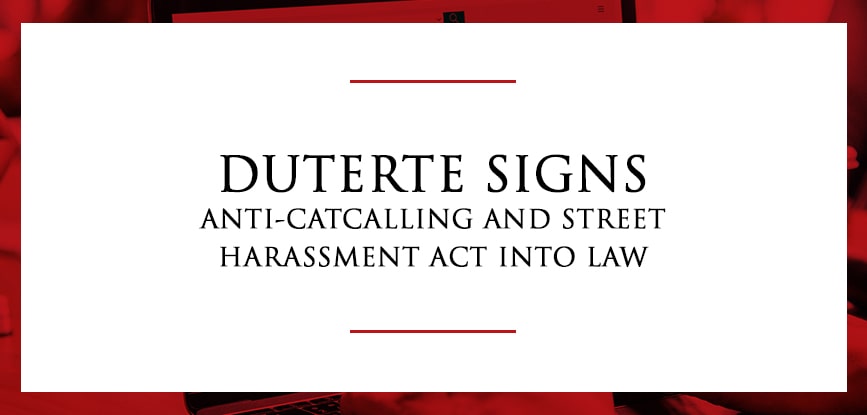
Duterte Signs Anti-Catcalling and Street Harassment Act into Law
The “Safe Streets, Workplaces, and Public Spaces Act of 2017”, an act that seeks to penalize catcalling and other street-based harassment, is finally signed into law. Senator Risa Hontiveros, its principal author, announced its passage into law on May 29.
Sen. Hontiveros made the announcement on Twitter, stating that the new law is “a landmark victory against bastos (rude) culture”.
The anti-street harassment law seeks to penalize unwanted comments, gestures, and actions forced on a person in a public place without their consent, and directed at them because of their actual or perceived sex, gender, gender expression or sexual orientation and identity.
Actions considered as sexual harassment include unwanted cursing, wolf-whistling, cat-calling, leering, sexist, homophobic or transphobic slurs, persistent requests for someone’s name, number or destination after clear refusal, persistent telling of sexual jokes, use of sexual names, comments and demands, flashing, public masturbation, groping, and stalking, among others.
The new law is an expansion of the Anti-Sexual Harassment Act of 1995 — which only covers sexual harassment committed by people with authority in the workplace, schools, and training institutions. The new law seeks to include those committed in public places and towards members of the LGBT community.
Both chambers of Congress, the House of Senate and House of Representatives, passed their individual versions of the law, Senate Bill (SB) No. 1558 and House Bill (HB) No. 8794, on October 2018 and January of this year, respectively.
Violations of the anti-street harassment law will be categorized as light, medium or severe.
Light violations are punishable by P1,000 to P3,000, eight hours of community service or six to thirty days in prison, depending on the frequency of the offense (1st, 2nd or 3rd offense).
Medium violations are punishable by P3,000 to P5,000, eight hours of community service or eleven days to six months in prison, depending on the frequency of the offense (1st, 2nd or 3rd offense).
Severe violations are punishable by P4,000 to P10,000 or one to six months in prison, also depending on the frequency of the offense (1st, 2nd or 3rd offense).
Besides the abovementioned penalties, first-time offenders in all categories are required to attend a Gender Sensitivity Seminar conducted by the Philippine National Police in coordination with the local government unit and the Philippine Commission on Women (PCW).
